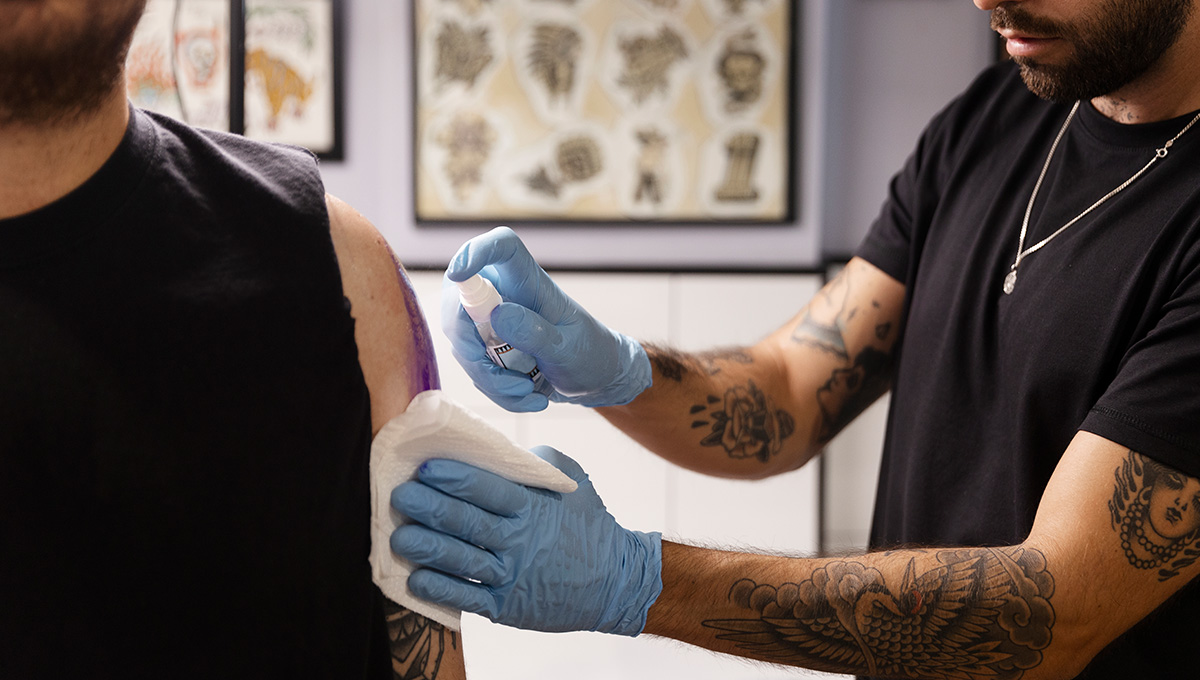
The success of your tattoo parlor depends on how seriously you take your business. Running a successful tattoo parlor is no walk in the park. It takes skills, creativity, and a deep commitment to hygiene. As tattoo artists, we understand that your goal is to create stunning pieces of body art. But that doesn’t mean you have to sacrifice your well-being and that of your client. Therefore, it’s important to ensure a safe environment. That’s where maintaining high standards of hygiene becomes paramount.
Poor hygiene practices in your tattoo parlor can lead to the spread of blood-borne diseases such as hepatitis, HIV, and staph infections. As a responsible tattoo artist, you must prioritize cleanliness and sterilization to ensure the safety of yourself and your clients.
Let's find out more about why hygiene is so important when tattooing. Why should you (as a tattoo artist) care?
Importance of hygiene in tattooing
Tattooing is a medical procedure that involves the use of needles, so it is important to maintain strict hygiene standards. Since needles are used, the risk of infection remains high (if things are not clean and sterilized). Putting both your career and your client's well-being at risk is the last thing you would want.
Infections are not the only concern in tattooing. There is also a high risk of spreading blood-borne pathogens (HIV or hepatitis). If you are not proactive in sterilizing and cleaning equipment before each use, you increase the risks of transmitting these blood-borne diseases from one person to another. Therefore, be careful about cleaning and sterilizing all the items you use for tattooing in your studio.
Now let's move on to the steps you need to follow before starting a tattoo.
Pre-tattoo hygiene practices
The importance of having a clean tattooing work environment cannot be overstated. Here are the best pre-tattoo hygiene practices you should follow to ensure everyone's safety:
-
Hand hygiene is key:It is essential to wash your hands before you begin tattooing. Use an antibacterial soap to clean your hands thoroughly. This helps to remove any dirt or bacteria that could contaminate the tattoo area.
-
Wear gloves to avoid contamination:Disposable gloves are a must for tattoo artists. They create a barrier between the client's hands and skin, which in turn prevents the spread of germs and blood-borne pathogens.
-
Preparing a sterile workstation:Keep your tattoo studio sanitized at all times. This is especially important before you start tattooing your client. From the tattoo machine, ink caps to needles, you should sterilize everything before performing the procedure. This way, you can create a clean and safe environment where your clients will enjoy getting their tattoo and feel comfortable.
Following best hygiene practices should be a fundamental part of your job. After all, you are responsible for the safety and well-being of your customers.
Establishing a sterile work environment
Once you have cleaned all of your tattoo equipment, it is time to create a sterile environment. Show that you care about your clients. This will make a huge difference in how your clients feel about your studio. Not only does it help create a strong bond with them, but it will also help you appear responsible. So, let’s follow these steps to create a sterile environment:
-
Disposable Supplies:Keep disposable ink caps, gloves, razor blades and needles in your workshop. Use them only once and dispose of them after each use to avoid cross-contamination and reduce the risk of infection.
-
Sterilized Tattoo Kits:Sterilize and clean all reusable items in your tattoo kits before using them on a client. These items must remain free of bacteria and other contaminants.
-
Surface disinfectants:Using surface disinfectants is the best way to prepare your workstation for the intended work. Prioritize regular disinfection of all surfaces of the tattoo machine, work surfaces, chairs, and other items used for tattooing.
Follow these hygiene rules for tattoo artists to create a hygienic workspace where your clients feel safe and satisfied with the work performed.
Maintaining hygiene during the tattoo procedure
Tattooing uses needles that penetrate the skin, which increases the risk of infection from viruses and bacteria. It is your job to make sure this doesn't happen during the tattoo. Here are some basic hygiene practices that every tattoo artist should keep in mind during the procedure:
-
Change gloves if they become contaminated:Change your gloves (during the tattoo) if they become contaminated with blood or ink. Prevention is better than cure. This way, you avoid the spread of bacteria and other blood-borne pathogens.
-
Using paper towels:Make sure to use paper towels to wipe away any excess ink or blood during the tattoo procedure. Dispose of them in a designated place immediately after use.
-
When performing a tattoo, it is important to ensure that there is no risk of cross-contamination. Clean and dirty materials should be stored separately to avoid contamination and reduce the risk of infection.
Hygiene and aftercare after tattooing
Your job as a tattoo artist doesn't end with the tattoo. You need to perform some post-cleanup tasks to ensure that your client leaves your booth with a satisfied mind and a healthy body. Wondering what post-cleanup steps you should follow? Here are:
-
Proper waste disposal:Once your tattoo is done, it's time to dispose of contaminated materials in a safe place. For example, you should dispose of used needles, gloves, paper towels, and other single-use items in a designated container.
-
Sterilization of reusable equipment:Take the time to thoroughly clean and sterilize all reusable equipment. Make sure to sterilize your tattoo machine, grips, and power cords as well. This ensures they are ready for the next client.
-
Storage of sterilized equipment:Store the sterilized equipment in a sealed container to protect it from contamination until next use.
Once you've completed the job, provide your clients with these aftercare instructions:
-
Advise your client to keep the tattoo clean and dry.
-
It is recommended to use aftercare ointment on the tattoo.
-
It is recommended not to swim, use hot tubs or saunas until the tattoo is healed.
-
Ask them to protect the tattoo from sunlight and excessive heat.
-
Make sure they do not scratch or pick at the tattoo.
Following these aftercare guidelines can help your clients recover faster and minimize the risk of complications.
Aftercare instructions for your tattoos
-
Keep the tattoo clean and dry.
-
Apply the recommended aftercare ointment as directed.
-
Avoid swimming, hot tubs and saunas until the tattoo is healed.
-
Protect the tattoo from sunlight and excessive heat.
-
Do not scratch or pick at the tattoo.
-
Wear comfortable clothing to avoid friction from clothing.
Following these aftercare guidelines can help your clients recover faster and minimize the risk of complications.
Compliance with local regulations
Complying with local and international tattoo hygiene regulations is essential to protecting public health. These regulations ensure that tattoo studios maintain clean and safe environments. Failure to comply can have serious consequences, including legal penalties and damage to your business.
Make sure you are familiar with all local, state, and federal regulations governing tattoos. Many areas require tattoo artists to obtain specific certifications or licenses. These certifications demonstrate their commitment to hygiene and safety standards.
The tattoo industry evolves, and so do regulations. Stay informed about changes in industry standards and legal requirements to ensure continued compliance. By complying with local regulations, you contribute to a safe and professional tattoo industry.
Conclusion
The biggest concern that prevents someone from getting a tattoo is hygiene. That is why, as an artist running a tattoo business, it is essential to ensure their safety.
Prioritizing cleanliness and safety ensures the safety of your clients and guarantees you a solid reputation in the market. Keep an eye on the latest hygiene practices to maintain the highest standards in your tattoo studio.
Frequently Asked Questions
1.How to maintain hygiene when getting a tattoo?
Hygiene is key when tattooing. Always use sterile equipment, wear gloves, and keep your workspace clean. Dispose of needles and other sharp objects properly in a separate container. Sterilize equipment and other valuable tools for your safety.
2.What do tattoo artists clean with?
Tattoo artists use hospital-grade disinfectants to clean surfaces and equipment. For the skin, they use antiseptic solutions.
3.What are the health conditions for tattoos?
Make sure your client is in good health while getting a tattoo. If they have diabetes, blood disorders, or any skin infections, this could affect the healing process.


